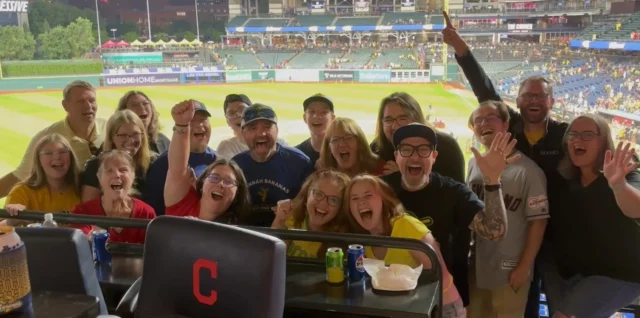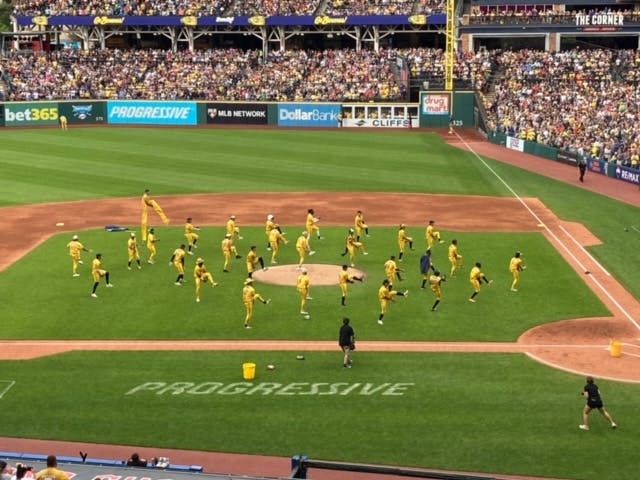Fans First…Always

It’s been an incredible summer of fun for my wife and me.
We were able to catch a Toledo Mud Hens game (and indulged in some Tony Paco’s hot dogs).
We traveled to Philly to watch Arsenal play Liverpool.
We listened to (and watched) the Cleveland Orchestra play to Raiders of the Lost Ark and The Lord of the Rings (Return of the King). Note: not at the same time.
We laughed to Dave Attell and Lewis Black at Hilarities 4th Street Theatre in Downtown Cleveland.
We awed at authors James Patterson and Mike Lupica at the Cleveland Public Library.
We enjoyed the smooth sounds of Leslie Odom Jr at Blossom Music Center.
We cheered on our Cleveland Guardians seven times (to a 5 and 2 record).
We coordinated the 18th Annual Orange Effect Foundation Golf for Autism (raising money for children who need speech therapy).
And we topped it all off with an amazing show by the Savannah Bananas at Progressive Field in Cleveland.

You might remember I discussed the Savannah Bananas in Issue 68 of this newsletter. At that time, they were a bit obscure. Today they are the greatest show in sports.
Over 35,000 people joined a six-hour party in and around the field.
I’ve been to hundreds of baseball games all over the country but I’ve never seen so many smiles over such a long period of time at a game.
Between the Man-Nana’s “Dad-Bod” cheer team, to the Banana Baby of the game (played to Lion King music), to the constant music and the dozens of trick plays, it was hard to concentrate on just one thing.
The game, called Banana Ball, is a timed game limited to two hours. Over that period, hardly anyone left their seats. Even in between innings. No one wanted to miss anything.
After the game no one wanted to leave. When we left 45 minutes after the final pitch, the band was still playing outside the stadium with thousands of fans cheering and watching.
Hats off to my friend (and Banana Ball creator) Jesse Cole, and his wife Emily, for pulling off this business model. He is today’s version of P. T. Barnum. They sacrificed everything, going millions of dollars in debt to buy the Savannah team and broken-down Grayson Field in 2016. Now eight years later, Jesse and Emily are on their way to creating a billion-dollar sports league (they have three teams already).
If you’d like to know more about the model here’s a good overview (albeit a bit dated).
The key to their success? Before Jesse does anything on or off the field, he asks “is this fans first?” If it is, it’s a yes. If not, it’s a hard no.
I highly recommend Jesse’s book Fans First. I’ve read it a few times now and always find something new and inspiring.
Writing Tips from James Patterson
My wife gave me an awesome gift last week and took me to see authors James Patterson and Mike Lupica talk about their new book Hard to Kill.
Outside the fact that the two together are like a comedy vaudeville act, I had a number of takeaways. As a novelist and an author of a number of business books I’m always interested in the habits of successful writers.
So here goes.
Patterson said the key to his success is writing every day. That’s every day, including the weekends. He was adamant on that point…and to create it as a habit where you feel guilty, or feel like something is missing, if you don’t do it.
According to everything I’ve read, it takes about two months to make something a habit…so that means we need to set aside time to write (or create) for 60 days in order to get to that point.
When I wrote my thriller, The Will to Die, I wrote five days a week. I would take the weekends off, and I remember how that Monday would come around and it would be difficult for me to get back in the groove. I like the “every day writing” thing from that respect. You should stay in the groove instead of having to re-acclimate yourself.
Patterson outlines everything before beginning a book. He doesn’t just sit down and start to write. He said that every single book he writes or co-writes begins with a 50+ page outline (which seems incredible to me). He also said that his first novel, The Thomas Berriman Number, was almost completely an outline. He said he ended up with a couple hundred pages of very short sentences and then he realized he had a book. He now believes that his short sentence outline feel was how he became known for his dialogue-driven short-chapter style of novel writing.
What was really interesting is that, multiple times, he said his grandmother told him that hungry dogs run faster, and that stayed with him. He says that every writer must find some drive, something that makes them hungry to do what’s necessary to be successful.
He also added that he loves books because they can be finished. Once he’s done with a book it gets published. He doesn’t edit or polish repeatedly and believes that perfection is the enemy of progress. At some point, like Seth Godin says, you have to ship.
My biggest takeaway is to make writing, or maybe in your case, podcasting or YouTube or TikTok, a regular part of your day. It’s just something you do. I think once you get to that point, you become the writer or the YouTuber or the podcaster…you’ll find success, whether that’s in six months or six years.
Patterson is at the point where the story ideas just flow, because it’s a part of him, his life, every day. It’s not divine inspiration.
I like that. I like to believe if we get up and do one thing per day, and then the next, and keep doing it, greatness is attainable.
Two Keys to Books that Sell
Now that I’m getting more involved in the book publishing business (with Tilt Publishing) I get to see authors doing some incredible things, and also making some horrible, cringe-worthy mistakes.
A few days ago I had an author come to me who was, to be honest, pretty despondent about their book launch. Even with thousands of followers this business author only sold a handful of books. Now, mind you, a good business book can sell for years, but often if you don’t get a good running start it can peter out pretty quickly.
In this case, we realized there were two key issues with their book launch.
The first thing is the title of the book. The title of your book is everything.
According to authors like Rory Vaden and Marcus Sheridan, the title of your book needs to be a payoff for the buyer. The buyer of your book needs to quickly see your title and within seconds realize that book is or is not for them.
Let me give you an example.
My 2013 and 2023 book Epic Content Marketing. A great title that worked. Anyone interested in content marketing says, ‘yes, I want and need epic content marketing.’ A very quick response either way. And at that time it played off the most trending phrase in marketing, which was content marketing.
My recent book, The Content Entrepreneur, not a great title. Now, I love that title. I think that the term content entrepreneur should be a thing and content creators should want to become content entrepreneurs…but a couple issues.
First, content entrepreneur is still an obscure phrase. Seeing it doesn’t necessarily mean anything yet to content creators. Second, what is the payoff? Is being a content entrepreneur a payoff? I don’t think so. Probably should be something like “creator millionaire” or “creator freedom” or something like that.
Remember, you want to visualize your perfect buyer walking by your book on a bookshelf and immediately knowing it’s for them. Two to three seconds. If they must think about it just a little, you’ve missed the mark.
Killing Marketing was a great book. One of our best (written with Robert Rose). Terrible title. No marketer wants to kill marketing. Big missed opportunity there.
Now, once you get this amazing title, you can leverage the title with an elevator pitch that sets the stage for your promotion and marketing.
Let’s go back to Epic Content Marketing. This book became a cornerstone to driving business and awareness for everything I was doing. I pitched the concept for articles on other websites, to be a guest on podcasts or to be the key speaker on dozens of webinars. I also parlayed this into in-person speaking events where I really sold the concept of the book.
I broke it down into something like “Joe talks about six strategies that help marketers break through the clutter online and actually win more customers by marketing less”. I can’t tell you how good that line worked to open up new opportunities.
So…to sell as many books as possible, you need both a killer title and an amazing elevator pitch.
